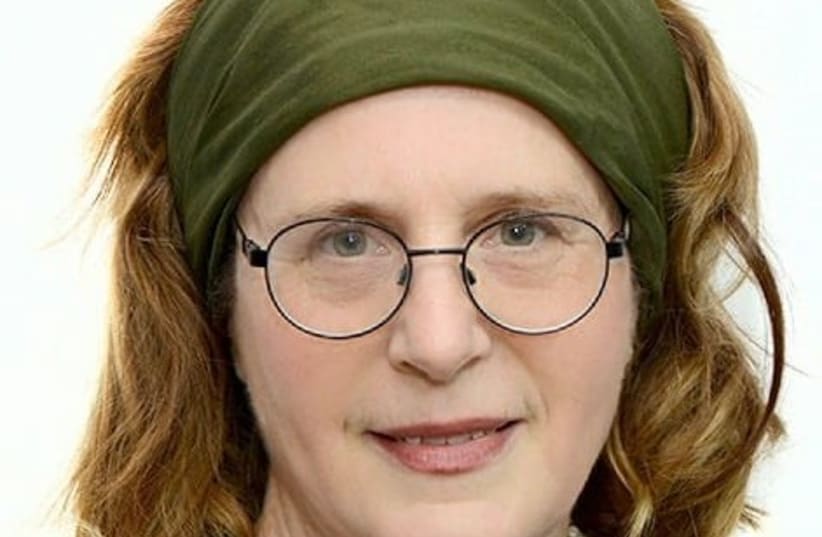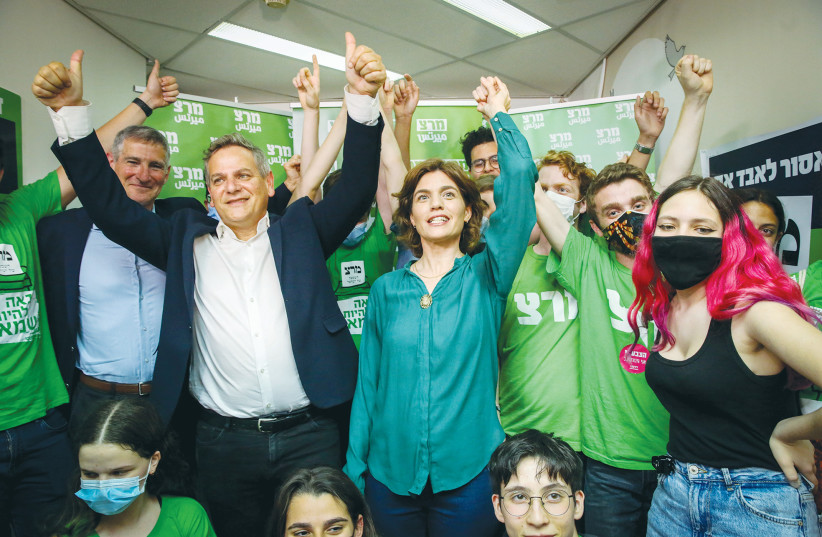The mantra that best encompasses the synthesis of Orthodox Judaism and modernity is “Torah im Derech Eretz,” literally “Torah and the ways of the world,” in other words, openness to the achievements of modernism.
Ofra Kaplan, lawyer, graduate of Cambridge University and haredi candidate in the Meretz primary election, has another version: “Torah im Derech Meretz,” or Torah with the path of Meretz. This phrase perhaps best captures Kaplan, who views the values of the left-wing party and her Judaism as complementary.
“There is nothing on the Meretz platform that a haredi person, that a person who has ‘yirat shamayaim,’ fear of heaven [cannot support].... We have to start caring about the other person because the other person is made in the image of God, and not because they look different than us... Jews, as citizens of this country,” she said in an interview with The Jerusalem Post.
Torah values in Meretz
For Kaplan, the country has forgotten how to be normal.
“The ideology that Meretz stands for is the ideology of normality,” she said. “[Me being haredi] is irrelevant. I am a Cambridge University graduate, I have perfect English, I have perfect Hebrew, I work as a lawyer, I have an economic background. I am perfect to be a member of Knesset and make this world a better place for all our kids.
“The fact that I wear a sheitel and my husband wears a black hat, my girls are at Beis Yaakov and my boy is at yeshiva is kind of irrelevant.
“Except that because I am haredi, which means to be in fear, that I am doing the right thing to that extent it is 100% relevant because I know I am doing the right thing that I believe Hashem [God] wants me to do.”
For Kaplan, her career as a lawyer is part of this creed. She works as a commercial lawyer for an international law firm based in Tel Aviv, and her clients are start-ups and hi-tech companies involved in green energy, agritech, mental and physical health, cybercrime solutions and many more, “all aimed at making the world a better place,” according to Kaplan’s campaign brochure.
"Until the messiah comes all we have is a democracy, that's the best thing we've got. Whether on a white donkey or a white new Lamborghini, democracy is all we've got."
Ofra Kaplan
Ofra Kaplan's qualifications
Kaplan was born in Britain to South African parents who were socially active and belonged to a community center that was “open to the wider world.” She studied economics at Cambridge University and law at the City University of London, where she was involved in action against general anti-Israel sentiment and antisemitism.
After immigrating to Israel and moving to Tel Aviv, Kaplan joined a number of social activist organizations, including “Tel Aviv for Bicycles,” which promotes the construction of bike paths; the environmental nonprofit Adam Teva VaDin; and an initiative called Yama VaKedma, which provides learning programs in Judaism and business ethics, environmentalism and comparative religion.
She was also one of the youngest members of the Meimad Committee, which spearheaded the left-wing religious-Zionist movement founded in 1988 by Rabbi Yehuda Amital. Kaplan eventually qualified as a lawyer in Israel, and currently resides in Karmiel. She commutes to her job in Tel Aviv using public transportation.
Politics was the next natural next step, and Kaplan is aiming to project her ideology to a larger audience.
“Being involved at a higher level means that you don’t work on individual contracts, but you can help shape society to be a better place,” she said.
Kaplan participated in Meretz’s 2019 primary election and hopes to make it to a realistic spot this time around. She intends to bring her unique perspective to the Knesset, and her views on economics are an example.
Economy of sharing
“Just in the last few days, [MK] Gaby Lasky of Meretz talked about how we need to change the way we talk about environmental issues and consumption, and create a more rounded economy, where people share and borrow things instead of purchasing them,” Kaplan said.
“Haredim have been doing this for centuries,” she said. “There is a gemach [interest-free loan fund] for wedding dresses. There is a gemach for shoes, and the secular kibbutzim were also doing it.”
“It’s not that I’m anti-capitalist,” Kaplan said. “We live in a capitalist world. I’m part of a capitalist machinery. I’m a commercial lawyer. I start start-ups and hi-tech Israeli companies to finance their contractual relations. I don’t think capitalism is a bad thing, and Judaism also does not believe capitalism is a bad thing. Judaism recognizes that there is no end to poverty, which is why tzedakah is legislated.”
She said several issues especially infuriate her, beginning with matters of religious coercion. For example, she said, just because there are those who do not drive on Saturday, why should secular people who do not own cars not have public transportation to enjoy their weekends in their own way? Why should two men feel uncomfortable holding hands in public or not be able to get married? And why are some unruly youths damaging trains and committing acts of vandalism in the name of religion?
Young people are especially important for Kaplan. She believes that Israelis grow up in separate communities, do not know each other and literally do not speak each other’s languages. Every Israeli child should study Arabic, she said, and every child from the Arab sector should finish high school knowing Hebrew. Normalcy for Kaplan also means opposing the “hilltop youth.”
“Allowing children to go onto hilltops and start taking land from Palestinians – this is not my Judaism. How dare they?” she said.
Torah im Derech Meretz, she said, is a synthesis between personal freedoms and collective respect.
“I don’t want Israel to be a melting pot; I prefer a salad,” Kaplan said. She doesn’t like the word pluralism.
“When you put two people in a room, there are 25 different definitions of pluralism,” she said. “What we need instead is respect.
“Democracy is all we’ve got, and we’ve got to hold on to it because the day you stop working at it, it starts falling,” she added. “And that is what is happening in this country... all this throwing mud at people because of their personalities rather than their policies. We’ve got to stop throwing mud.”
“Until the Messiah comes, all we have is a democracy; that’s the best thing we’ve got,” Kaplan said. “Whether [the Messiah arrives] on a white donkey or a white new Lamborghini, democracy is all we’ve got.”

